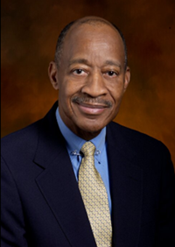
Emily Aarons, MD, a third-year psychiatry resident, received this year’s James H. Carter, Sr. Community Service Award.
James H. Carter, Sr., MD, was the first Black full professor of psychiatry at Duke University Medical Center. The Carter Clinic, LLC, led by M. Ojinga Harrison, MD—an alumnus of the Duke internal medicine-psychiatry residency program and a close colleague of Carter—established this award in honor of Carter’s commitment to community service.
Carter’s Dedication to Serving the Underserved

Carter dedicated his career to serving the underserved. In addition to his faculty position at Duke, he played a critical role in building mental health services at Lincoln Community Health Center in Durham, the Alcohol Treatment Center in Raleigh, the Johnston County Mental Health Center and the North Carolina Department of Corrections.
Carter provided critically needed clinical and educational services during his career and inspired and mentored scores of budding mental health professionals. He was recognized for his work at the institutional, local, state and national levels, including receiving the Solomon Carter Fuller Award in 2003. Toward the end of his career, he co-founded the Carter Clinic with his wife, Elsie Carter.
Learn more about Carter’s life and legacy.
Award Recognizes Service in Community Psychiatry
The James H. Carter, Sr. Community Service Award recognizes one or two Duke Psychiatry & Behavioral Sciences trainees each year for outstanding commitment and service in community psychiatry, particularly among underrepresented minorities and with attention to health disparities. Award recipients receive a certificate and $1,500 from the Carter Clinic in recognition of their service.
Caring for Migrant Farmworkers
Aarons was selected for the award in recognition of her work with a migrant farmworker mobile clinic that serves farmworkers in Eastern North Carolina.
The clinic is staffed by University of North Carolina at Chapel Hill family medicine doctors and medical students in collaboration with community health outreach workers at the North Carolina Farmworkers Project.
Migrant farmworkers face significant barriers to healthcare access, and the mobile clinic model helps close this gap by traveling to different farmworker dwelling sites and offering primary care. Mental health is a particular area of unmet need in this population that faces unique psychosocial stressors.
Over the past year, Aarons has been working with one of her co-residents, Andres Fuenmayor, MD, to pilot a collaborative care mental health model at the mobile clinic. They piloted screening measures, group education, and direct psychiatric consultation, and they’re in the process of evaluating and refining their roles for the upcoming growing season.
“Working with migrant farmworkers throughout medical school and residency has inspired me more than I can articulate,” Aarons reflected. “I am deeply grateful for the opportunity to connect with farmworkers and learn from the outreach and clinical teams who have been examples of true dedication to community health.”
“I am deeply grateful for the opportunity to connect with farmworkers and learn from the outreach and clinical teams who have been examples of true dedication to community health.”
— Emily Aarons, MD
She added that this initiative would not be possible without the leadership of the health outreach workers, Modjulie Moore, MD (mobile clinic director), Andres Fuenmayor, MD, and the Duke psychiatry residency program.